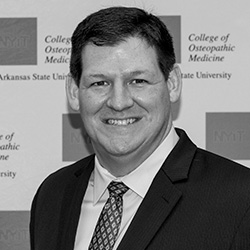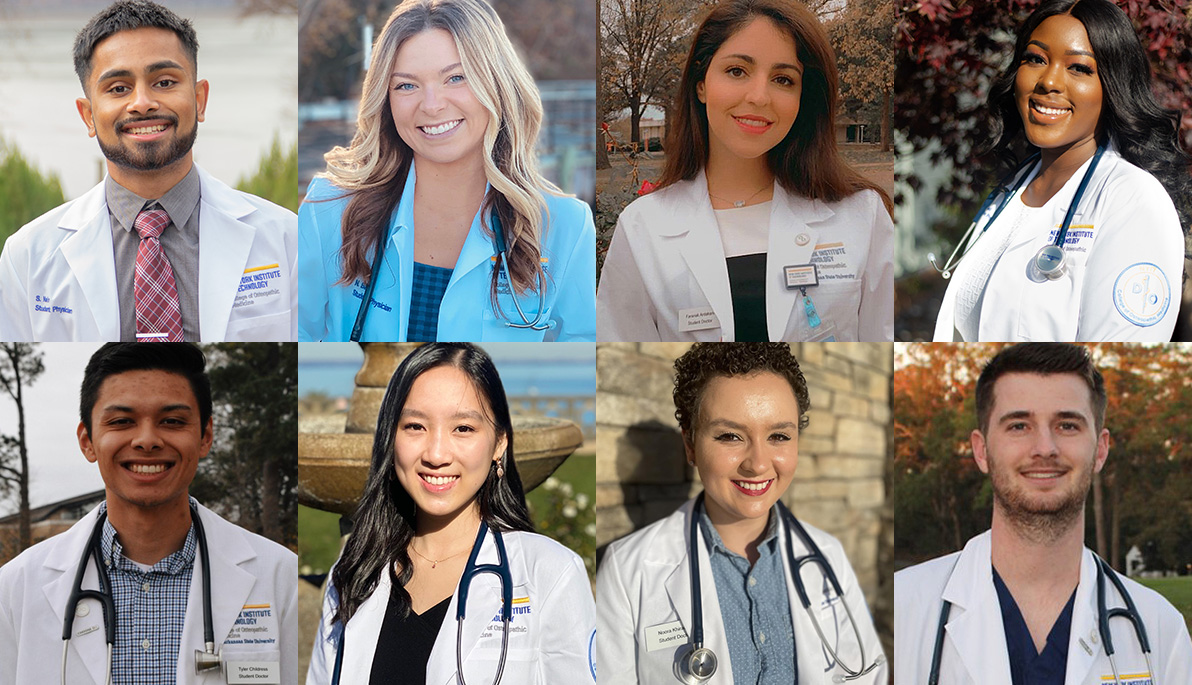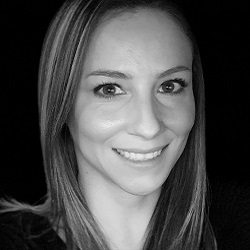News
NYITCOM Class of 2024 Receives White Coats
January 13, 2021
Pictured clockwise from top left: Sooraj Nair (NYITCOM-Long Island), Nicole Batt (NYITCOM-Long Island), Faranak Ardakani (NYITCOM-Arkansas), Nyajei Vandi (NYITCOM-Long Island), Charles Wood (NYITCOM-Arkansas), Noora Khiraoui (NYITCOM-Arkansas), Jennifer Guo (NYITCOM-Long Island), and Tyler Childress (NYITCOM-Arkansas)
As United States healthcare workers began receiving some of the first vaccines in the fight against COVID-19, first-year NYIT College of Osteopathic Medicine’s (NYITCOM) students completed a rite of passage in their medical school journey: the white coat ceremony.
Viewed by many as the official start of medical school, the white coat has been a symbol of cleanliness, trust, and healing in the medical profession since the late 1800s. While medical students at both NYITCOM-Long Island and NYITCOM-Arkansas are typically coated at the start of the fall semester with large, in-person gatherings, due to the pandemic, this year’s events were held virtually via live stream in early January. Just as they would at the in-person event, each student of the Class of 2024 was recognized for taking the critical first step in their medical education. Both ceremonies featured a slideshow, with each future physician pictured in their white coat.
The Class of 2024 will also be recognized with an in-person ceremony prior to the start of their third-year clinical rotations. NYITCOM Dean Nicole Wadsworth, D.O., commended the class’s resilience during the January 4 NYITCOM-Long Island ceremony, in which 319 first-year medical students were recognized. She also reminded them to view the pandemic’s challenges as an opportunity for innovation.
“Even though this year is so unusual, it has allowed us to be more creative and explore opportunities that we never even considered in the past and adapt to develop even better ways to approach your medical education,” she said. “Over the past eight months, I have taken multiple opportunities to reflect on our current situation and have been deliberate in learning and adapting as we are challenged with an ever-shifting external environment. I’ve also spent time reflecting on how and what I was feeling, and there has been one dominant feeling—it is hope.”
The NYITCOM-Arkansas white coat ceremony on January 11 honored 124 first-year medical students who began their medical education in Jonesboro last August.
“While this is certainly not the white coat ceremony we envisioned for you, it does not diminish the significance of the event in any way,” said Shane Speights, D.O., site dean of NYITCOM-Arkansas. “In fact, during this time of a global healthcare crisis, it actually becomes more significant.”
Jerry Balentine, D.O., executive vice president and chief operating officer and former dean of NYITCOM, reminded the newly minted medical students of their larger mission in solving today’s most pressing healthcare challenges.
“In 2020, the white coat has taken on a new meaning and new importance as some people started referring to healthcare workers treating COVID patients as heroes,” he said. “As much as this was exciting to witness, I also want to remind you that it’s always been that way—whether it was HIV, multi-drug resistant TB, or Ebola—this is what we do as physicians.”
Doctors began wearing white coats in the 1880s when the famous physicians Joseph Lister and Ignaz Semmelweis championed hygiene and hand-washing as a standard medical practice. During this time, the white coat became a symbol of the highest cleanliness, and from a practical viewpoint, white coats were much easier to wash than the typical dark wear that physicians wore prior to the turn of the 20th century.
The NYITCOM Class of 2024 fills the shoes of the medical school’s 2020 graduates, who secured impressive residencies at institutions such as The Mayo Clinic, The Cleveland Clinic, Rutgers, and Penn State-Hershey, as well as specialties in orthopedic surgery, dermatology, psychiatry, pediatrics, emergency medicine, otorhinolaryngology, and many others.

By Casey Pearce



_Thumb.jpg)

